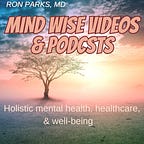For video or audio-only podcasts, click on your choice above to view or listen only.
Transcript:
Welcome to the Mind Wise Video podcast, which presents holistic mental health, healthcare, and wellness perspectives and information. I am your host, Ron Parks, MD writer, teacher, and consultant. A link to the entire presentation and article, with recommendations and references, is at the bottom of the transcript below.
Is there value in taking nutrition supplements in a holistic health program?
In today's fast-paced world, prioritizing our health and well-being is vital. The pros and cons of taking nutritional supplements are often prominent topics for the health-conscious and concerned. The arising issues are worth exploring, especially with all the confusing information. Supplement use is for a variety of reasons or needs. Examples of reasons or rationales for use might be for the seeking of health assurance, as an aid in recovery from illness, protection from unknown disease risk, gaining the edge in physical performance, or the search perhaps for invisibility or to counter our fears of our human vulnerability to health challenges.
Holistic health practitioners advocate for a balanced lifestyle with an optimal nutritional program to ensure the body receives the nutrients for optimal functioning and health protection. A healthy diet is essential for good health, considering that sometimes extra support is required with nutritional supplements to bridge any nutritional gaps or lack. In this article, I will share my experience and perspective on the need, if any, for high-quality dietary supplements and whether their use has value or merit.
My introduction and fascination with health and nutrition:
My exposure to the ideas about nutrition and the value of vitamins began when I was a small child when the marketing of food products was prominent on the radio and in the early days of TV, with the fortification of bread products with vitamins or minerals, or the promotion of orange juice for being rich in vitamin C, or vitamin D and calcium for strong bones in milk products. I remember one product that was a powder fortified with vitamins that you mixed with milk. It made a chocolate-like drink that didn't taste good for my taste buds, even with its significant promotion in the media and on one of my favorite kid's shows. The same was true of a mixed vegetable drink promoted to bring considerable health benefits. The idea and selling points were that exposure to more vitamins and minerals, as in concentrated vegetables or fruit drinks, would bring substantial health and growth benefits, perhaps make you an outstanding athlete, or protect you from the common cold and flu.
During a sweltering summer when I was a pre-teen, in the years before the polio vaccine, I came down with high fevers, headaches, and a stiff neck. My pediatrician knew right away that I had developed a form of polio, polio meningitis, and was sent immediately to the city children's hospital. After a meticulous evaluation, including a painful spinal tap, I was hospitalized with a diagnosis of post-polio meningitis but luckily recovered after 2–3-week hospitalization, with no residual symptoms as the feared paralyzes that left many with severe disabilities with loss of limb use. The severely affected died even with the use of sophisticated equipment of the day, such as artificial lungs for respiratory support. In the hospital, I was exposed to dietitians, nutritionists, physical therapists, and a slew of other medical and health-oriented people to optimize my recovery from the dreaded virus and regain my strength. I was fascinated by it all, and of course, it was a significant early life experience that strongly influenced me toward my medical career. The value and emphasis on nutrition, physical exercise, warm heat packs, hot baths in a heated pool, and the holistic approach to healing stuck with me and influenced my career direction.
Later in medical school, I was always fascinated with the early courses on nutrition and illness which occurred because of vitamin or mineral deficiencies, such as rickets when there is a lack of vitamin D and calcium, or scurvy when there is insufficient Vitamin C, and illness from vitamin, B12 or folic acid insufficiency. I was always amazed at how treatment or improvement occurred with corrections to nutrition. Nutritionists and dietitians were always part of the treatment teams when I worked in hospitals throughout my early career. Commonly, we would prescribe vitamin supplements or add nutritional additives to intravenous (IV) infusions or provide vitamin, mineral, or protein-fortified drinks to boost nutrition and provide support when bowel and digestive function was compromised. Nutrition education about dietary and nutritional choices was a part of the patient's hospital treatment to assist the patient in making good food choices and serving them what was considered a balanced diet.
When practicing, I had the opportunity to work with a prominent MD interested in nutrition, who researched the literature on the application of nutrition to support health and recovery from illness. He later published a compendium of his work in a textbook for holistic medical doctors and practitioners that was well received. He was also a proponent of IV nutrition support and nutritional supplements when indicated. So, I became interested and a proponent of using nutritional support when it felt of a need and value, which I integrated into my holistic approach to helping others and myself.
Understanding Supplements: Clearing Common Misconceptions
Many areas in medicine, such as studying the value of supplements, where we would like to find conclusive research evidence of benefits, are often lacking because of the complexity of the research issue, considerable variation in individual unique characteristics, and uncontrollable influencing factors, or simply lack of interest or a large amount of funding needed to do a complex study.
Supplements often get a poor reputation, with many misconceptions surrounding their use. It's essential to clear these misconceptions and understand the actual role of supplement use in our overall health. Supplements do not replace a balanced diet but complement it by filling in potential nutritional gaps. Professionally and ethically formulated nutritional products have the proper concentrations and forms of nutrients to ensure that they are better absorbed and utilized. However, choosing high-quality supplements, rigorously tested for purity and potency, is essential.
Taking supplements based on research and observational studies is often not as conclusive as we would like them to be or as marketers would like to suggest. Unfortunately, much of our behavior in taking nutritional products comes from our belief and faith that supplement use has real value. Many people derive what they know about nutrition and supplements from unreliable or misleading marketing material and advertising from supplement suppliers, businesses, and manufacturers. However, if you have decided that supplement taking is beneficial for your needs and trust the sources of your information, have done your research, or have felt the benefit of using supplements, it may be a wise choice.
I have pulled a few studies from nutritional literature to show the implications of some available studies. There are many studies in nutritional literature. Suppose you pull examples like those referenced below. Generally, they support the idea that dietary supplements may improve the nutritional state and reduce malnutrition in specific populations, such as geriatric patients and people with specific or chronic conditions.
Debunking Myths: Quality vs Quantity
One common misconception is that taking more supplements will lead to better health. However, the key lies in the quality of the supplements we choose, not the quantity. Also, discerning choice is required when selecting supplements with a track record based on research, demonstrating benefit in the areas where we seek improvement or prevention. High-quality supplements contain the proper form and amount of active ingredients to optimize absorption and utilization. Low-quality supplements may contain fillers, additives, or nutrient forms that are not easily absorbed, rendering them less effective or potentially harmful in the long run.
It's not about how many pills we take or our beliefs, but critically about what's inside the pills, the formulation, and the quality of the active ingredients. You must ultimately decide if the supplement is beneficial based on positive experiences and observed health improvement, recovery, or prevention. Whether you are a believer or scientist, quality over quantity should be a priority when you take supplements. Today, we often hear of illness when foods or processed nutritional products appear with contaminants, such as lead and arsenic, and where illness or worse occurs. Then, there is a widespread recall of contaminated products or processed foods. Also, reports will suggest that harm occurs when there is too much of a particular ingredient or a formulation is not well formulated, balanced, or lacks adequate quality control.
Navigating Through Deceptive Marketing
The supplement industry has many products that make grandiose claims without substantial scientific evidence to back them up. It's essential to look beyond the marketing hype and do your research. When choosing supplements, it is worthwhile to examine the company and the product, looking for transparency in ingredient sourcing, manufacturing processes, and third-party testing. Trustworthy brands are usually upfront about their products, providing clear information and evidence of their supplement's efficacy. Educating yourself is the best defense against deceptive marketing and the first step towards finding supplements that support health and have valid reasons for taking them.
High-quality supplements have a better potential to boost or support health by providing nutrients in the right amounts and forms that may be difficult to get from diet alone or poor-quality supplements. High-quality supplements would be wise for individuals with specific health conditions or dietary restrictions. For example, a high-quality omega-3 supplement can support heart health and cognitive function, areas where these fatty acids play a crucial role and are needed.
Holistic Approach to Supplement Use
As a holistic health practitioner, and my journey in his discovery about the importance of nutrition, I have accepted the value of supplementation in my personal health program and support the use of supplements in others where they might offer benefit, especially when there is the desire for combining their use with a well-structured holistic health program. My journey with supplements began when I faced my own health challenges, such as developing a life-threatening viral illness, polio, as a child. As an adult putting myself through the rigors of athletic competition, as with my swimming, I felt my endurance and recovery benefited, as well as my overall health and longevity. I believe I avoided many health issues that besieged my peers. I lost an older brother to the ravages of obesity, diabetes, and heart disease, as well as other significant family members who very well might have had a longer life and aged more gracefully. In striving to maintain the best nutrition possible with a holistic health program, I felt generally more energetic, had better sleep, and had a more robust immune system. My personal experience sparked a passion for understanding and sharing the benefits of a vital nutrition program that might include nutritional supplementation.
Many individuals invest in ineffective products when ill-advised or misled by misinformation and misleading marketing, when sought or used to address a health need better addressed in other ways, or when a more comprehensive program needs consideration.
Conclusion
Incorporating high-quality supplements into one's daily routines and a holistic health program can enhance the journey toward optimal health and wellness. You can make wise, informed choices by dispelling common misconceptions and discovering the potential benefits of supplements for your health and specific needs. Always use a reputable supplier that carries and makes available the highest quality professional-grade supplement company products, educational materials, and support.
For the complete presentation and article with recommendations, references, and information about the supplier Dr. Parks uses for quality, professional-grade supplements, go to https://parksmd.com/is-there-value-in-taking-nutrition-supplements/. Click here.
I appreciate your interest; your ideas and comments are welcome. Please share with others. Subscribe to my Substack Newsletter and podcast at www.inmindwise.com. All content is created and published for educational purposes only. It should not be considered as a substitute for professional or medical services or guidance.
Always seek care from your healthcare provider regarding medical or mental health conditions. This communication is not intended to provide medical diagnosis, recommendation, treatment, or endorsement. Thank you.
For suggestions or help to set up or improve your holistic program for our mental and physical health and well-being. To schedule a personal session with Dr. Parks, go to https://parksmd.com/scheduling/










